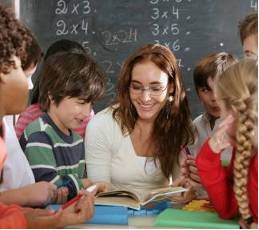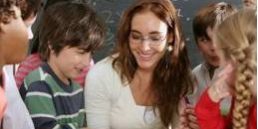Education: Whose Shoulders Carry the Weight?
by Carlynn McCormick

When it comes to a child’s education, who is the responsible party? Is it the federal government, state government, teachers’ union, school board, school officials, teachers, parents? Whose shoulders carry the burden? Certainly in one form or another, at one time or another, all of the above have been blamed when students go wrong. But what good comes from pointing fingers and demanding accountability?
In truth, education belongs to the child. What he learns, what he accomplishes, how well he succeeds is ultimately up to him. The responsibility is his.
Teachers, parents and anyone else involved in education have the duty of letting children know schooling is for them; not something done to them. When a child starts kindergarten, it is expected that he would be told why he is going to school. Believe it or not, this can be overlooked: I have talked with children who say, “School is somewhere to go so Mom and Dad can work.”
So the first step in assigning responsibility to a child is for the adults in that child’s life to take him into their confidence and let him know the plan. This is very easy to do. Why? Because the reason for going to school aligns with every child’s inherent need to make the unknown, known. If this is gotten across to a child, he will automatically have a purpose for learning to read, write, research and reason. He will know for himself that it is important to master the basics and he will muster up the courage to do it.
When children embrace the idea of conquering the unknown and the mysteries of life, they view time spent in school as interesting, exciting, a time of discovery, never as dull, monotonous drudgery. With such enthusiasm for learning, the child comes to think of school, his teacher, his readers and workbooks as all belonging to him.
This is the opposite of what is normally done in school where teachers give and students accept. In such a process, the teacher gives the lessons; the teacher corrects the students’ work; the teacher gives grades and makes the criticisms; the class belongs to the teacher. This may be dandy for the teacher, but this is not education.
To be educated, children must be taught that it requires personal participation and personal responsibility for one’s own work and conduct. A student will always, for example, work diligently on the step-by-step procedure for learning to read if he has set his own goal to be a good reader. Likewise, he will be eager to observe and research his surroundings if he has the goal of understanding his world better.
It is the teacher’s job to show students how to discover things for themselves. The teacher is not a task master; the teacher is a leader and a guide. She should clue children in that it is up to them to discover their own talents and their own purposes for learning each subject in school. The responsibility rests on their thin shoulders.
How often should this lesson be taught? From before the first day of school, repeated and reviewed throughout every school year, then again and again, from kindergarten to twelfth grade.
When a child knows with 100% certainty it is up to him to create his own education, his aspirations will soar like a rocket taking off for the stars!







